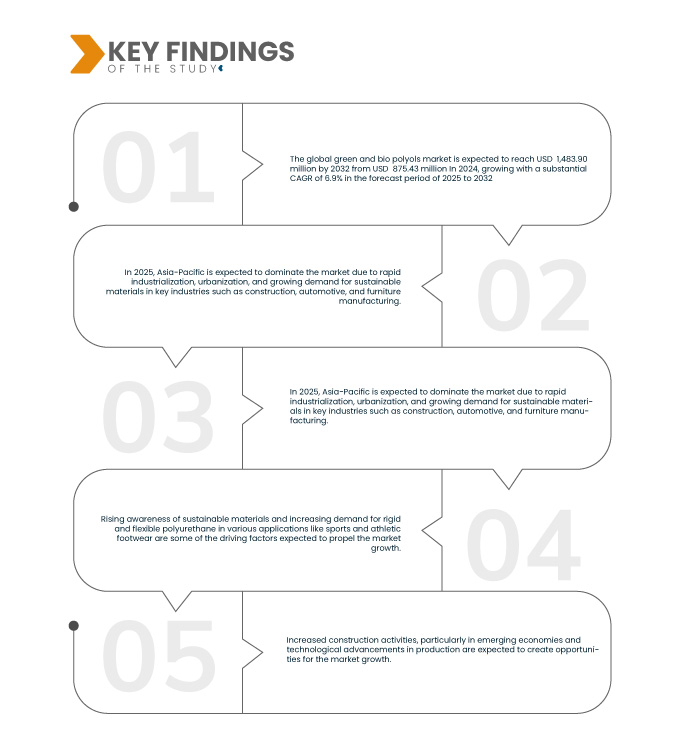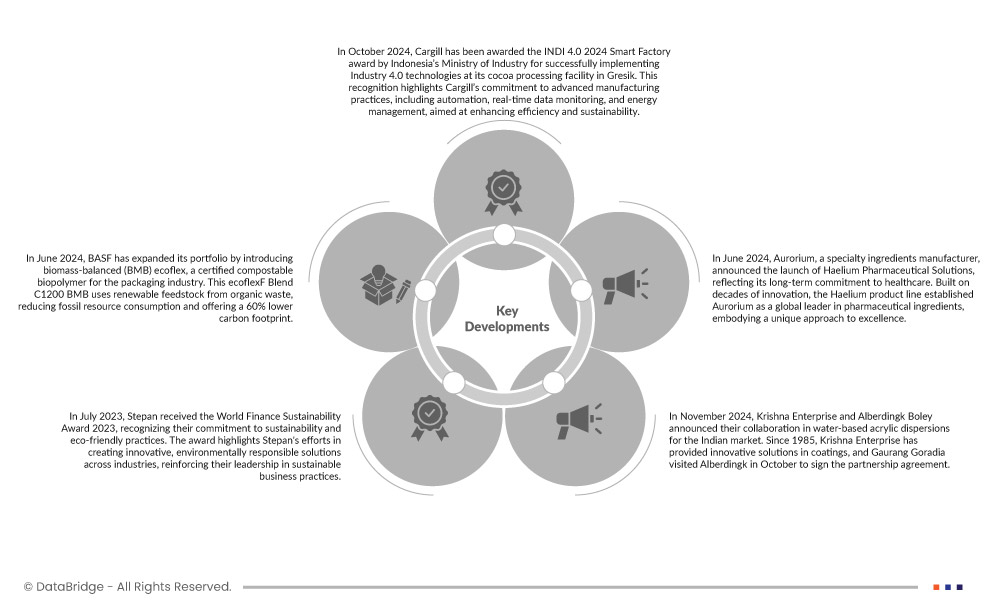Der weltweit wachsende Fokus auf Nachhaltigkeit beeinflusst die Nachfrage nach grünen und biobasierten Polyolen maßgeblich und verändert die Marktlandschaft. Mit dem zunehmenden Bewusstsein für die Umweltauswirkungen von Produkten aus fossilen Brennstoffen setzen Verbraucher und Industrie gleichermaßen auf nachhaltige Materialien. Dieser Paradigmenwechsel hat die Innovation und den Einsatz von grünen und Bio-Polyolen beschleunigt, die aus erneuerbaren Ressourcen wie Pflanzenölen und Recyclingmaterialien gewonnen werden.
Schlüsselindustrien wie die Bau-, Automobil- und Verpackungsindustrie setzen zunehmend auf diese umweltfreundlichen Polyole, um sich an strengere gesetzliche Rahmenbedingungen und veränderte Verbraucherpräferenzen anzupassen. Regierungen in verschiedenen Regionen führen Anreize und Vorschriften zur Reduzierung des CO2-Fußabdrucks ein, was die Nachfrage nach biobasierten Alternativen weiter ankurbelt. In der Automobilindustrie treibt die steigende Verbraucherpräferenz für umweltfreundlichere Fahrzeuge die Einführung von Bio-Polyurethan-Schäumen voran, die häufig in Sitzen, Innenausstattungen und Isolierungen eingesetzt werden. Auch die Baubranche nutzt grüne Polyole für energieeffiziente Dämmstoffe und bedient damit die wachsende Nachfrage nach Zertifizierungen für umweltfreundliches Bauen wie LEED.
Vollständigen Bericht abrufen unter https://www.databridgemarketresearch.com/reports/global-green-bio-polyols-market
Data Bridge Market Research analysiert, dass der globale Markt für grüne und Biopolyole voraussichtlich von 875,43 Millionen US-Dollar im Jahr 2025 auf 1.483,90 Millionen US-Dollar im Jahr 2032 anwachsen wird, was einem beachtlichen CAGR von 6,9 % im Prognosezeitraum von 2025 bis 2032 entspricht.
Wichtigste Ergebnisse der Studie
Steigende Nachfrage nach starrem und flexiblem Polyurethan in verschiedenen Anwendungen wie Sport- und Sportschuhen
Die steigende Nachfrage nach Hart- und Weichpolyurethan in verschiedenen Anwendungen, insbesondere im Sport- und Sportschuhbereich, ist ein wichtiger Wachstumstreiber für den globalen Markt für grüne und Bio-Polyole. Da Nachhaltigkeit in der Industrie zunehmend an Bedeutung gewinnt, gewinnt die Nutzung biobasierter Polyole für die Polyurethan-Produktion an Bedeutung, insbesondere in stark nachgefragten Branchen wie der Schuhindustrie.
In der Sportschuhindustrie spielt Polyurethan aufgrund seines geringen Gewichts, seiner Langlebigkeit und seiner Vielseitigkeit eine entscheidende Rolle. Harte Polyurethane werden häufig für Strukturkomponenten verwendet, während flexible Varianten für Dämpfungs- und Zwischensohlenanwendungen unverzichtbar sind. Da die Verbraucher zunehmend umweltfreundliche Produkte bevorzugen, setzen Schuhhersteller zunehmend auf biobasierte Polyurethane, um die Marktnachfrage zu decken und Nachhaltigkeitsziele zu erreichen. Führende Sportbekleidungsmarken wie Adidas, Nike und Puma stehen an der Spitze dieses Wandels. Ein Beispiel hierfür sind die Futurecraft. Footprint-Sneaker von Adidas, die biobasiertes Polyurethan aus nachwachsenden Rohstoffen enthalten und damit das Engagement der Marke für eine geringere Umweltbelastung widerspiegeln. Auch Nike integriert Biopolyole in seine Produktlinien, um Performance-Schuhe zu entwickeln, die Nachhaltigkeit und Funktionalität in Einklang bringen.
Berichtsumfang und Marktsegmentierung
Berichtsmetrik
|
Details
|
Prognosezeitraum
|
2025 bis 2032
|
Basisjahr
|
2024
|
Historische Jahre
|
2023 (Anpassbar auf 2013–2017)
|
Quantitative Einheiten
|
Umsatz in Millionen USD
|
Abgedeckte Segmente
|
Typ (Polyetherpolyole und Polyesterpolyole), Anwendung (Schaum, Beschichtungen, Klebstoffe, Dichtstoffe, Elastomere und andere)
|
Abgedeckte Länder
|
USA, Kanada, Mexiko, China, Japan, Südkorea, Indien, Australien und Neuseeland, Singapur, Malaysia, Thailand, Indonesien, Philippinen, Restlicher Asien-Pazifik-Raum, Deutschland, Frankreich, Italien, Niederlande, Großbritannien, Spanien, Belgien, Russland, Schweiz, Türkei, Luxemburg, Restliches Europa, Brasilien, Argentinien, Restliches Südamerika, Saudi-Arabien, Vereinigte Arabische Emirate, Ägypten, Südafrika, Israel, Restlicher Naher Osten und Afrika
|
Abgedeckte Marktteilnehmer
|
Cargill, Incorporated (USA), BASF SE (Deutschland), Emery Oleochemicals (USA), Stepan Company (USA), Polylabs TM (Lettland), Wanhua (China), ALBERDINGK BOLEY GmbH (Deutschland), BioBased Technologies (USA) und Aurorium (USA)
|
Im Bericht behandelte Datenpunkte
|
Zusätzlich zu den Einblicken in Marktszenarien wie Marktwert, Wachstumsrate, Segmentierung, geografische Abdeckung und wichtige Akteure enthalten die von Data Bridge Market Research kuratierten Marktberichte auch ausführliche Expertenanalysen, geografisch dargestellte Produktion und Kapazität nach Unternehmen, Netzwerklayouts von Distributoren und Partnern, detaillierte und aktuelle Preistrendanalysen und Defizitanalysen der Lieferkette und Nachfrage.
|
Segmentanalyse
Der globale Markt für grüne und Biopolyole ist je nach Typ und Anwendung in zwei wichtige Segmente unterteilt.
- Auf der Grundlage des Typs ist der Markt in Polyetherpolyole und Polyesterpolyole segmentiert.
Im Jahr 2025 wird das Segment der Polyetherpolyole voraussichtlich mit einem Marktanteil von 58,47 % den Markt dominieren.
Im Jahr 2025 wird das Segment der Polyetherpolyole voraussichtlich mit einem Marktanteil von 58,47 % den Markt dominieren. Dies ist auf die überlegene Hydrolysestabilität, die geringere Viskosität und die bessere Wasserbeständigkeit zurückzuführen. Diese Eigenschaften machen Polyetherpolyole besonders geeignet für Anwendungen in flexiblen und starren Polyurethan-Schäumen.
- Auf der Grundlage der Anwendung ist der Markt in Schaumstoffe, Beschichtungen, Klebstoffe, Dichtungsmittel, Elastomere und Sonstiges segmentiert.
Im Jahr 2025 wird der Schaum voraussichtlich den Markt mit einem Marktanteil von 63,94 % dominieren
Im Jahr 2025 wird der Schaumstoff voraussichtlich mit einem Marktanteil von 63,94 % den Markt dominieren, da er in Branchen wie dem Baugewerbe, der Automobilindustrie und der Möbelindustrie weit verbreitet ist. Polyurethan-Schäume, sowohl starre als auch flexible, werden häufig zur Isolierung, Dämpfung und Schalldämmung eingesetzt.
Hauptakteure
Data Bridge Market Research analysiert Cargill, Incorporated (USA), BASF SE (Deutschland), Emery Oleochemicals (USA), Stepan Company (USA) und Polylabs TM (Lettland) als wichtige Marktteilnehmer.
Jüngste Entwicklungen
- Im November 2024 gaben Krishna Enterprise und Alberdingk Boley ihre Zusammenarbeit im Bereich wasserbasierter Acryldispersionen für den indischen Markt bekannt. Seit 1985 bietet Krishna Enterprise innovative Lösungen im Bereich Beschichtungen an, und Gaurang Goradia besuchte Alberdingk im Oktober, um die Partnerschaftsvereinbarung zu unterzeichnen.
- Im Oktober 2024 wurde Cargill vom indonesischen Industrieministerium für die erfolgreiche Implementierung von Industrie 4.0-Technologien in seiner Kakaoverarbeitungsanlage in Gresik mit dem INDI 4.0 2024 Smart Factory Award ausgezeichnet. Diese Anerkennung unterstreicht Cargills Engagement für fortschrittliche Fertigungsverfahren, darunter Automatisierung, Echtzeit-Datenüberwachung und Energiemanagement, um Effizienz und Nachhaltigkeit zu steigern.
- Im Juli 2023 erhielt Stepan den World Finance Sustainability Award 2023 für sein Engagement für Nachhaltigkeit und umweltfreundliche Praktiken. Die Auszeichnung unterstreicht Stepans Bemühungen, branchenübergreifend innovative, umweltverträgliche Lösungen zu entwickeln und seine Führungsrolle im Bereich nachhaltiger Geschäftspraktiken zu stärken.
- Im Juni 2024 gab Aurorium, ein Hersteller von Spezialinhaltsstoffen, die Einführung von Haelium Pharmaceutical Solutions bekannt und unterstreicht damit sein langfristiges Engagement im Gesundheitswesen. Die Haelium-Produktlinie basiert auf jahrzehntelanger Innovation und etablierte Aurorium als weltweit führenden Anbieter pharmazeutischer Inhaltsstoffe mit einem einzigartigen Ansatz für Exzellenz.
- Im Juni 2024 erweitert BASF ihr Portfolio um das biomassenbilanzierte (BMB) ecoflex, ein zertifiziert kompostierbares Biopolymer für die Verpackungsindustrie. Dieses ecoflexF Blend C1200 BMB nutzt erneuerbare Rohstoffe aus organischen Abfällen, reduziert den Verbrauch fossiler Ressourcen und bietet einen um 60 % geringeren CO2-Fußabdruck.
Regionale Analyse
Auf der Grundlage der Länder ist der Markt in die USA, Kanada, Mexiko, China, Japan, Südkorea, Indien, Australien und Neuseeland, Singapur, Malaysia, Thailand, Indonesien, Philippinen, den Rest des asiatisch-pazifischen Raums, Deutschland, Frankreich, Italien, Niederlande, Großbritannien, Spanien, Belgien, Russland, Schweiz, Türkei, Luxemburg, das übrige Europa, Brasilien, Argentinien, das übrige Südamerika, Saudi-Arabien, die Vereinigten Arabischen Emirate, Ägypten, Südafrika, Israel und den Rest des Nahen Ostens und Afrikas unterteilt.
Laut Marktforschungsanalyse von Data Bridge:
Der asiatisch-pazifische Raum ist die am schnellsten wachsende Region und wird voraussichtlich die dominierende Region auf dem Markt sein.
Im Jahr 2025 wird der asiatisch-pazifische Raum voraussichtlich den Markt dominieren, da dort die Industrialisierung und Urbanisierung rasch voranschreitet und die Nachfrage nach nachhaltigen Materialien in Schlüsselindustrien wie der Bau-, Automobil- und Möbelindustrie steigt.
Für detailliertere Informationen zum globalen Marktbericht für grüne und Biopolyole klicken Sie hier – https://www.databridgemarketresearch.com/reports/global-green-bio-polyols-market













